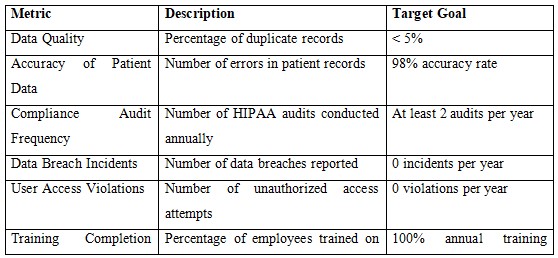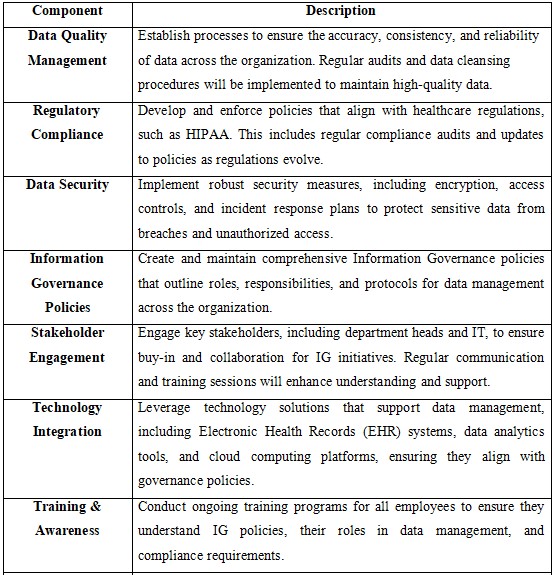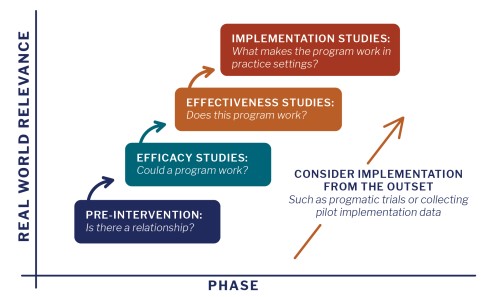Proposed Information Governance Framework for MedHealth Structures: Enhancing Data Integrity, Compliance, and Operational Efficiency
Introduction
Information Governance (IG) has emerged as an essential issue inside the management of healthcare records, ensuring no longer entirely compliance with regulations but additionally the safety of sensitive patient records and the enhancement of organizational decision-making skills (Karampatakis et al., 2023). MedHealth Structures, an outstanding healthcare employer, has been an industrial corporation for more than 50 years and has gathered massive portions of data, each in challenging reproduction and virtual formats. While a few facts are saved in relational databases, there may be nowadays a loss of effective records control hints, leading to issues that include fact duplicity and data integrity troubles. MedHealth Structures, a prominent healthcare organization with over 50 years of industry experience, has accumulated vast amounts of data in both physical and digital formats. Despite storing some information in relational databases, the organization currently lacks a cohesive and effective data management strategy. This has led to significant challenges, such as data duplication, inconsistencies, and integrity issues. The absence of standardized data governance practices across departments complicates efforts to maintain accurate, reliable, and timely information, which is critical for informed decision-making, regulatory compliance, and efficient operations in a rapidly evolving healthcare landscape. Addressing these challenges is crucial for future success.
Industry Context
The healthcare organization is in particular data-dependant, with hospitals, clinics, and related offerings dealing with big portions of private statistics, which embody scientific data, billing statistics, and coverage claims. As a result of stringent pointers, collectively with the health Insurance Portability and Accountability Act (HIPAA), healthcare organizations have to put in action sturdy IG frameworks to govern this information securely and compliantly. Moreover, the transition from paper records to Electronic Health Records (EHRs) has exacerbated the need for effective governance to make sure that information remains accurate, reachable, and secure (Si et al., 2021). The healthcare corporation faces precise disturbing conditions in terms of data control. the ones embody ensuring patiental privacy, retaining data integrity at some point of disparate structures, and complying with a complicated regulatory environment. Moreover, healthcare executives require properly timed get admission to to correct data to make informed preferences, mainly in areas along with affected individual outcomes, financial overall performance, and operational performance (Sarwar et al., 2022). Consequently, the development of a comprehensive IG software program is imperative to MedHealth structures capability to stay aggressive, compliant, and secure. The healthcare industry provides a unique set of challenges regarding records control, particularly for agencies like MedHealth structures. making sure the privacy of sensitive patient statistics is paramount, because the effects of breaches can be excessive, leading to now not only financial penalties however additionally loss of trust from sufferers. patient privacy is protected under strict regulations, including the Health insurance Portability and Accountability Act (HIPAA) within the country, which calls for healthcare companies to put into effect strong measures for safeguarding personal health records. With an increasingly digitized environment, healthcare businesses need to manage data throughout multiple systems, electronic health records (EHR), economic structures, and different administrative platforms, at the same time as keeping the integrity and accuracy of this information.
In addition, complication is the necessity of complying with an ever-evolving and complicated regulatory landscape, which includes each country wide and global legal guideline. Compliance is not constrained to HIPAA however also encompasses different mandates such as the general data Protection Act (GDPR), which might also impact global healthcare agencies, and more specialized policies regarding medical research or drug management. Non-compliance can bring about intense fines and legal ramifications, making it essential for healthcare businesses to hold thorough and updated Information governance (IG) practices. In addition to these compliance demanding situations, healthcare executives have to make knowledgeable selections in real-time, leveraging facts that affects patient consequences, economic health, and overall operational efficiency. Information this is fragmented, old, or inconsistent can undermine decision-making approaches, leading to suboptimal consequences. For MedHealth systems to stay competitive in any such worrying environment, the development of a comprehensive IG software is essential. This software should no longer solely protect facts however additionally make certain its availability, accuracy, and consistency throughout all organizational systems. By doing so, MedHealth structures can hold compliance, enhance operational efficiency, and improve patient effects, all at the same time as reducing risks associated with data breaches and regulatory consequences.
Literature Review
The notion of Information Governance (IG) in healthcare has developed substantially over the last few many years because the industry has moved from paper-based to virtual statistics. Literature on IG emphasizes the want for healthcare companies to enforce comprehensive governance frameworks that address data safety, compliance, and integrity. Smallwood (2014) outlines the indispensable elements of IG, which include the establishment of rules, the identification of key stakeholders, and the implementation of technological answers. These elements are integral in healthcare because of the sensitive nature of patiental data and the increasing regulatory needs imposed through laws like HIPAA.
Davenport and Glaser (2002) talk the importance of providing executives with well-timed provision to accurate records, a key issue for healthcare companies in which patient consequences and economic overall performance are without delay inspired by using the fine of available data. Bet, Lee, and Glaser (2017) similarly emphasize the position of technology in dealing with healthcare data, especially inside the adoption of EHRs, that have become a preferred for information garage and management in the industry. Ethical issues additionally play a significant position in healthcare IG. Harman and Flite (2015) deal with the ethical challenges concerned in coping with health data, which include problems associated with patient consent, records possession, and the ethical use of healthcare data for research functions. Those concerns must be considered when developing governance regulations to make sure that MedHealth structures no longer only complies with legal necessities but additionally adheres to the highest ethical requirements. The concept of Information Governance (IG) in healthcare has evolved significantly as the industry transitioned from paper-based systems to digital information management. With the increasing digitization of health records, the need for robust IG frameworks has become essential to safeguard sensitive patient data, ensure compliance with regulatory standards, and maintain data integrity. Smallwood (2014) emphasizes key elements of IG, together with the established order of comprehensive regulations, identification of vital stakeholders, and the combination of technological solutions. These additives are especially essential in healthcare due to the private nature of patient statistics and the stern regulatory frameworks, like the medical Health Insurance Portability and Accountability Act (HIPAA), which mandate rigorous data protection and privacy standards.
Davenport and Glaser (2020) highlight the need of providing healthcare executives with well timed, correct, and reliable information to help decision-making. In healthcare corporations, patient effects, clinical performance, and financial performance are carefully tied to the available information. Wager, Lee, and Glaser (2017) in addition underscore the pivotal function of technology, especially the adoption of electronic health records (EHRs), which have end up the usual for healthcare statistics garage and control. EHRs now not only improve the accessibility and coordination of care but additionally ensure that records are available throughout numerous healthcare systems at the same time as maintaining its integrity.
Ethical issues are any other imperative element of healthcare IG. Harman and Flite (2015) cope with the ethical challenges related to coping with health information, which includes acquiring patient consent, determining facts possession, and ensuring the moral use of healthcare records for research functions. Those worries have to be factored into governance frameworks to make sure that healthcare companies like MedHealth observe legal necessities while upholding the very best ethical standards. A sturdy IG framework in healthcare need to balance prison, technological, and ethical dimensions to foster faith and enhance patient care consequences. Ethical concerns play a critical role in shaping effective Information Governance (IG) frameworks in healthcare. Harman and Flite (2015) highlight numerous ethical demanding situations that should be addressed, together with the need for clean patient consent, problems surrounding statistics possession, and the accountable use of healthcare data in studies. These challenges are in particular essential in technology where digital health data is an increasing number of used for various purposes beyond patient care, which includes analytics and clinical studies. Incorporating those moral concerns into governance frameworks ensures that healthcare corporations like MedHealth not solely observe legal requirements, which include HIPAA, but also adhere to the highest moral standards. A well-established IG framework that balances criminal, technological, and ethical elements fosters patient trust, promotes transparency, and ultimately improves the care and patient consequences.
Program and Technology Recommendations
Metrics
To ensure the effectiveness of the IG software, MedHealth structures ought to tune the subsequent key metrics:
Data quality Metrics: This consists of the share of duplicate information, accuracy of patient data, and the timeliness of information updates.
Compliance Metrics: This includes the frequency of HIPAA audits, the quantity of records breaches, and the reaction time to data get admission to requests.
Consumer access Metrics: Monitoring who accesses patient data and for what motive to make sure compliance with statistics access policies.
Data for Executives
Healthcare executives at MedHealth systems require well timed access to data related to patient consequences, operational efficiency, and financial overall performance (Wahono & Ali, 20221). Imposing a dashboard that aggregates real-time information from diverse structures will allow executives to make informed selections quickly. Regular reports on compliance metrics and data quality have to also be provided.
Regulatory, Security, and Privacy Compliance
Compliance with HIPAA is paramount for MedHealth structures. The IG program should include strong data encryption techniques, everyday audits, and strict access to controls to protect patient data (Choi & Williams, 2022). The program ought to also ensure compliance with other relevant rules, which include the HITECH Act, which governs the tight and closed control of digital health information.
Email Strategy
All emails containing sensitive or patient data must be encrypted and adhere to HIPAA guidelines. Implement a Data Loss Prevention (DLP) system to monitor and block unauthorized sharing of protected information (Kern et al., 2024). Regular staff training will reinforce secure handling and email encryption practices.
Social Media Strategy
Establish strict social media policies that align with HIPAA, ensuring no patient data is shared online. Only designated staff can post on official accounts, with content reviewed for compliance (Quesenberry, 2022). Regular training will guide safe social media engagement in healthcare. These strategies ensure MedHealth maintains patient privacy, complies with regulations, and minimizes security risks.
Cloud Computing Strategy
As healthcare move in the direction of cloud-based information garage, MedHealth systems need to make sure that its cloud services organisation complies with HIPAA tips. Cloud storage have to be encrypted, and ordinary audits must be accomplished to ensure data integrity and safety. MedHealth's cloud computing strategy ensures HIPAA-compliant data storage by requiring encrypted cloud services and conducting regular audits to verify data integrity and security (Shah & Konda, 2022). This approach safeguards patient information as MedHealth transitions from physical records to digital formats, aligning with the companys goals for secure, accessible data management while addressing regulatory and privacy needs.
Conclusion
The proposed Information Governance (IG) program for MedHealth structures will address the real thing traumatic conditions going through the agency, consisting of facts integrity, regulatory compliance, and the need for executive selection-making guide. With the assistance of enforcing the encouraged policies, metrics, and technologies, MedHealth structures will make certain that its records are impervious, correct, and available. This comprehensive IG program will now not entirely help the corporations meet its regulatory duties but also effectively enhance its operational performance and assist higher patient outcomes with the proper help of knowledgeable decision-making. By using the usage of making an investment in strong IG practices, MedHealth systems might be located to leverage its data properties correctly even as preserving the belief of patients and stakeholders alike.
Figures and Tables
Table 1: Key Metrics for Information Governance Program


Table 2: IG Program Implementation Framework



Figure 1: IG Program Implementation Framework
(Source: Self developed)
Are you struggling to keep up with the demands of your academic journey? Don't worry, we've got your back!
Exam Question Bank is your trusted partner in achieving academic excellence for all kind of technical and non-technical subjects. Our comprehensive range of academic services is designed to cater to students at every level. Whether you're a high school student, a college undergraduate, or pursuing advanced studies, we have the expertise and resources to support you.
To connect with expert and ask your query click here Exam Question Bank

